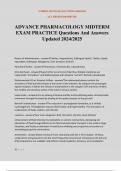©THESTAR EXAM SOLUTIONS 2024/2025
ALL RIGHTS RESERVED.
ADVANCE PHARMACOLOGY MIDTERM
EXAM PRACTICE Questions And Answers
Updated 2024/2025
Routes of Administration - answer✔Patches, Suppositories, Sublingual tablets, Tablets, Liquid,
Injectables, Sublingual, Nasogastric, Elixir (contains alcohol)
Parenteral Routes - answer✔intravenous, intramuscular, subcutaneous
Anti-diarrheals - answer✔Stops further occurrence of diarrhea. Notable medicines are
Loperamide "Immodium" and Diphenoxylate with Atropine "Lomotil" Bismuth subsalicylate
Diphenoxylate HCl w/ Atropine Sulfate - answer✔The submucosal plexus controls the
secretions of fluid and electrolytes in the lumen of the intestine. By acting on the presynaptic
opioid receptors, it blocks the release of acetylcholine in the synaptic cleft and hence inhibits
the motility and secretory action of the enteric nervous system.
Loperamide - answer✔acts by slowing intestinal motility and by affecting water and electrolyte
movement through the bowel by binding to the opiate receptor in the gut wall
Bismuth Subsalicylate - answer✔The reduction in prostaglandin formation, as it inhibits
cyclooxygenase. Prostaglandin induces inflammation and hypermotility. The stimulation of
reabsorption of fluids, sodium, and chloride
Laxatives - answer✔Four main categories: Bulk, Stimulant, Osmotic, Stool Softener
enhancement of fluid retention by hydrophilic or osmotic mechanisms, decreasing net
absorption of fluid through effects on the fluid and electrolyte transport in the small or large
intestines, and finally an alteration of motility by inhibiting non propulsive contractions or
stimulating propulsive contractions
Antiemetics - answer✔block serotonin from interacting with the 5-HT3 receptor. Of these,
ondansetron and granisetron are the most frequently encountered. Intravenous (IV) and oral
(PO) preparations are available. Side effects include headache, dizziness, and constipation
1|Page
, ©THESTAR EXAM SOLUTIONS 2024/2025
ALL RIGHTS RESERVED.
Treats nausea and vomiting
Ulcers - answer✔Open sores in the lining of the digestive system
Drugs to treat ulcers - answer✔omeprazole (Prilosec), lansoprazole (Prevacid), rabeprazole
(Aciphex), esomeprazole (Nexium) and pantoprazole (Protonix)
Irritable Bowel Syndrome - answer✔a common condition of unknown cause with symptoms
that can include intermittent cramping, abdominal pain, bloating, constipation, and/or diarrhea
Drugs for Irritable Bowel Syndrome - answer✔Alosetron (Lotronex), Eluxadoline (Viberzi),
Rifaximin (Xifaxan), Lubiprostone (Amitiza), Linaclotide (Linzess)
Alosetron (Lotronex) - answer✔works by blocking the action of serotonin on the intestinal
system. This reduces the cramping abdominal pain, abdominal discomfort, urgency, and
diarrhea caused by IBS
Eluxadoline (Viberzi) - answer✔contains mixed opioid receptors, including mu receptor agonist,
a delta receptor antagonist, and a kappa receptor agonist. It acts locally in the enteric nervous
system, and decreases adverse effects on the central nervous system.
Rifaximin (Xifaxan) - answer✔a semi-synthetic derivative of rifampin and acts by binding to the
beta-subunit of bacterial DNA-dependent RNA polymerase blocking one of the steps in
transcription. This results in inhibition of bacterial protein synthesis and consequently inhibits
the growth of bacteria.
Lubiprostone (Amitiza) - answer✔selectively stimulates type 2 chloride channels in epithelial
cells thereby causing an efflux of chloride into the intestinal lumen. The resultant fluid secretion
into the gastrointestinal lumen provides a bolus effect that softens stool, increases intestinal
transit, and improves symptoms of constipation
Linaclotide (Linzess) - answer✔contains an active ingredient called linaclotide, which reduces
intestinal pain and accelerates gastrointestinal transit, according to nonclinical studies. The
drug increases the cyclic guanosine monophosphate (cGMP) levels to decrease the pain
Crohn's and ulcerative colitis - answer✔NOD 2 upregulates receptor for muramyl (type of
PAMP) (bacterial products) and increases nf-kb transcription which leads to a pro inflammatory
state
furthermore, absence or damage to tight junctions exacerbate inflammatory response.
Drugs for Crohn's and Ulcerative Colitis - answer✔Infliximab (Remicade), adalimumab (Humira)
and golimumab (Simponi), Vedolizumab (Entyvio), Ustekinumab (Stelara)
2|Page




